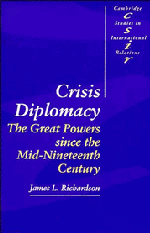Book contents
- Frontmatter
- Contents
- List of tables
- Acknowledgments
- I PART I
- PART II
- PART III
- 10 Crises and the international system: arenas, alignments and norms
- 11 The choice of goals: values, interests and objectives
- 12 Selective perception and misperception
- 13 Crisis bargaining
- 14 Internal politics
- 15 The outcome and the risk of war
- PART IV
- Notes
- Select bibliography
- Index
- CAMBRIDGE STUDIES IN INTERNATIONAL RELATIONS
15 - The outcome and the risk of war
Published online by Cambridge University Press: 03 May 2011
- Frontmatter
- Contents
- List of tables
- Acknowledgments
- I PART I
- PART II
- PART III
- 10 Crises and the international system: arenas, alignments and norms
- 11 The choice of goals: values, interests and objectives
- 12 Selective perception and misperception
- 13 Crisis bargaining
- 14 Internal politics
- 15 The outcome and the risk of war
- PART IV
- Notes
- Select bibliography
- Index
- CAMBRIDGE STUDIES IN INTERNATIONAL RELATIONS
Summary
How is the outcome of crises determined? In particular, what can now be said on the relative importance of crisis decisions and diplomacy, on the one hand, and ‘structural’ and other long-term determinants, on the other? Many historians place the emphasis on the long-term, ‘underlying’ causes. Crises, it is suggested, resemble the tip of an iceberg: the visible tip is moved by the submerged bulk of the iceberg, responding to ocean currents invisible to the observer. Such images draw attention to the need for a thorough understanding of the background of any crisis, but the preceding analysis has shown that outcomes are not predetermined by underlying causes. A crisis is not, like the tip of an iceberg, an inert mass whose movements depend entirely on forces external to it. The question cannot be resolved so simply.
Contemporary historical scholarship amounts to an ongoing debate rather than a preferred answer to the question. This is well brought out in James Joll's reappraisal of the explanations of World War One. Some historians, he notes, favour the Marxist style of explanation in terms of ‘a comparatively small number of basic factors’, but this leaves a gap between the general analysis and the specific decisions taken in 1914.
- Type
- Chapter
- Information
- Crisis DiplomacyThe Great Powers since the Mid-Nineteenth Century, pp. 327 - 346Publisher: Cambridge University PressPrint publication year: 1994

